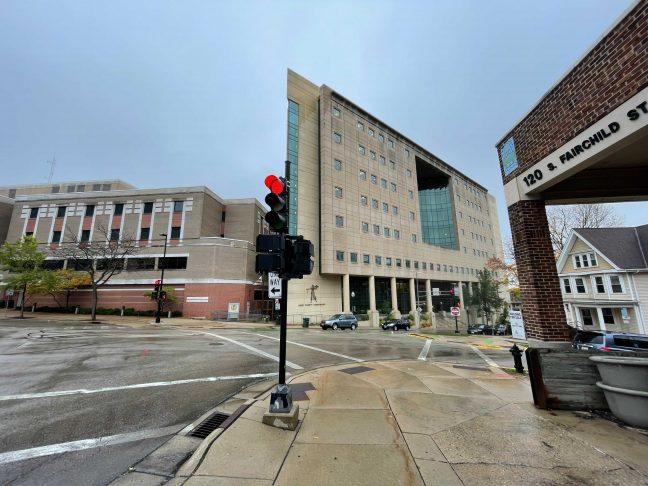The state of Wisconsin does not allow residents with previous felony convictions to cast their ballot until they have finished parole, probation or extended supervision, according to PBS Wisconsin. As a consequence of this law, 63,000 Wisconsinites are not represented in state and national elections, according to WKOW. More alarming, however, is the racial makeup of these disenfranchised individuals.
According to WKOW, Black individuals make up only 6% of the state population, yet account for 41% of Wisconsin’s incarcerated population. WKOW also said Indigenous people, who make up only 0.70% of the state population are 11 times more likely to be convicted of a felony than their white counterparts.
Minority populations not only face a higher risk of imprisonment, but their representation in state and national elections is also endangered.
A report by the American Civil Liberties Union reveals Black Milwaukee drivers are ten times more likely to be pulled over by police officers than white individuals. Housing segregation and over-policing of Black and minority neighborhoods also contribute to the disproportionate imprisonment of Black individuals in Wisconsin, ACLU’s former legal director Larry Dupuis told NBC.
It is clear lawmakers use disproportionate imprisonment in tandem with disenfranchisement laws to deliberately exclude people of color from affecting election outcomes.
For instance, the Federal Voting Rights Act of 1965 outlawed methods used since the Jim Crow era to prevent Black individuals from voting, according to The Center for Public Integrity.
Conveniently, former Presidents Richard Nixon and Ronald Reagan replaced these discriminatory tactics with a “war on drugs” to reinstate the exclusion of Black individuals — this time via mass incarceration.
The “war on drugs” of the 1970s intentionally targeted Black populations despite the equal use of drugs amongst Black and white populations, according to the Equal Justice Initiative. Coupled with the criminalization of minor, low-risk drug offenses, the deliberate disenfranchisement of Black individuals had tangible consequences for major election outcomes, according to a 2001 article written by ACLU Drug Policy Litigation Project founder and director Graham Boyd. The article highlights the 2000 presidential election, in which minor drug offenders in Florida faced felony charges, losing their right to vote without even having to spend any time in jail. As a result, 200,000 African American residents were barred from participating in the election, swaying election results in favor of the Republican Party.
Shockingly, politicians still use mass incarceration to exclude certain populations to sway election results in their favor. For instance, according to the Center for Public Integrity, 1.2 million individuals lost their voting rights due to incarceration in 1976. By the time former President Donald Trump became president by a mere 80,000 votes in 2016, there was a fivefold increase in the number of excluded voters.
UW launches new program to support first-generation students
Allowing politicians to use mass incarceration as a device to orchestrate elections in their favor is not only a sickening attack on Americans’ constitutional rights, but also a direct threat to our democracy. Mass incarceration compromises the fairness of our elections by shunning targeted populations from equal representation.
Individuals who have left jail, but are still on parole, probation or extended supervision feel as though they are bearing the burden of citizenship without receiving the full benefits of being a citizen.
Milwaukee resident Ramiah Whiteside, who was released from prison in 2019 and later passed away, would not have been able to vote until 2042, according to the Milwaukee Journal Sentinel. Still, he was be required to pay taxes upon leaving prison, despite the complete stifling of his voice in government affairs.
Whiteside said he experienced the “modern reflection of taxation without representation.”
Ranked-choice voting proposal would depolarize elections, better represent voters
The extent to which previously incarcerated individuals are alienated from socio-political affairs can be seen in states that have newly extended voting rights to individuals with felonies. Devyn Roberts, a formerly incarcerated individual from Kentucky, told The Marshall Project she was unable to cast a vote for the majority of her life due to her felony records. But, when her home state of Kentucky restored voting rights to former convicts, Roberts was so politically disconnected that she was not aware of the policy change.
Similarly, former inmate Robert Pate told The Marshall Project he was shocked by the number of prisoners who felt like “they weren’t part of society,” and did not have any rights. Pate said these sentiments of alienation diminished these individuals’ desire to create or even want positive change for their communities.
How are we to promote equity and inclusion in sociopolitical realms if the incarcerated population — which, according to Wisconsin Watch, is 42% Black in Wisconsin as of 2020 — is continually pushed to the fringes of society?
An obvious method of reducing the racial disparity in voting exclusion is to reduce the disproportionate incarceration of Black populations and other minority groups through policy changes. But according to PBS, the Republican Legislature declined all of Gov. Tony Evers’s policy proposals regarding criminal justice. We cannot wait until equity in imprisonment rates is achieved in hopes it will restore voting rights to excluded minority groups.
It is important that the state of Wisconsin turns its attention to the outdated disenfranchisement laws that continue to threaten the fairness of our election and alienate a targeted portion of the population. According to WKOW news, neighboring states like Iowa, Illinois and Minnesota are finally restoring the constitutional rights of previously incarcerated individuals. It is urgent Wisconsin does the same.
Aanika Parikh ([email protected]) is a sophomore studying molecular and cell biology.





















